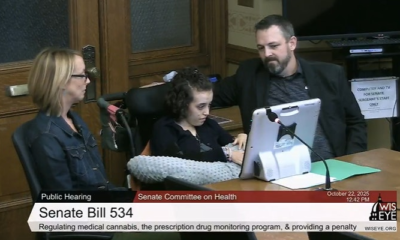Business
THCA, other hemp derivatives challenge legal cannabis markets
Published
1 year agoon

It looks like marijuana, smells like marijuana, and when consumed, feels exactly like marijuana. But according to the businesses selling it, this isn’t marijuana at all; it’s hemp, rich in a compound called THCA. And it’s popping up in smoke shops, gas stations and even dedicated storefronts across the U.S.
“It’s just weed, bro,” the CEO of Cookies, Gilbert Milam Jr., who is better known as Berner, said during an interview with LMC in February. “It’s just weed that tests under a certain number for a certain situation at the end of the day.”
That “certain number” is 0.3% delta-9 THC, the federal limit for hemp set by the 2018 Farm Bill. THCA, or tetrahydrocannabinolic acid, is a nonintoxicating precursor that converts to THC when heated. The technicality has spawned a booming market for what are essentially legal marijuana products, available even in states where delta-9 THC products remain prohibited.
The proliferation of THCA products represents the latest evolution in a rapidly growing market for hemp-derived cannabinoids. It’s a trend that’s raising alarm among cannabis industry leaders and confounding regulators.
And in many ways, it’s also exposing the unintended consequences of America’s piecemeal approach to cannabis reform.
The Minnesota experiment
Minnesota recently embraced cannabis legalization with a unique model focused on small, craft businesses. But the rise of THCA is presenting an unexpected challenge to those carefully laid plans.
Leili Fatehi, partner at Blunt Strategies, the team behind Minnesota’s “MN is Ready” legalization campaign, finds herself grappling with this new reality.
“The whole idea behind maintaining that robust hemp program was that it gives these smaller businesses a runway to begin generating revenue, establish their businesses, get their brand established,” Fatehi explained.
Minnesota’s approach to hemp regulation was initially seen as complementary to its marijuana legalization efforts. The state prohibits artificial and synthetic cannabinoids while allowing the sale of naturally derived minor cannabinoids, such as CBD, CBG and CBN. It also permits delta-9 THC within specified potency limits.
But THCA products exist in a legal gray area, often skirting the regulations and taxes imposed on the cannabis industry while offering similar effects to consumers.
The McConnell irony
The impact of THCA products extends far beyond Minnesota. Charles Bachtell, CEO of Cresco Labs, voiced his apprehension during an International Cannabis Bar Association panel last month in Chicago.
“What we’ve seen in the last couple years is a fairly irresponsible version of intoxicating hemp products being available, being promoted, being inconsistent,” he said.
Bachtell’s concerns go beyond mere market competition. He sees these products as potentially jeopardizing the hard-won progress in cannabis reform.
“For me, anything that challenges or jeopardizes the work that so many people have been at this so many years… of getting cannabis to the appropriate legal designation, if it jeopardizes it, I have an issue with it,” he said.
Jeremy Unruh, an executive at PharmaCann, spoke to that point regarding the 2018 Farm Bill during the same panel in Chicago.
“I don’t think that Mitch McConnell, when he was trying to authorize his Kentucky tobacco farmers to replace their crops with industrial hemp, intended to create a path for intoxicating cannabinoids that can be consumed,” Unruh told the audience.
“To me, it’s about how do we fix the problem … holistically? That all goes back up to the Farm Bill at the end of the day.”
The legal ambiguity surrounding THCA products extends beyond federal regulations. States are grappling with how to address these products within their own regulatory frameworks. Some, like California and Virginia, have taken steps to crack down on hemp-derived cannabinoid products altogether.
Still, enforcement has proved challenging. In New York, licensed hemp retailers have reported being caught up in raids targeting unlicensed marijuana operations. Jed M. Weiss and Joshua S. Bauchner, partners at Mandelbaum Barrett PC, recently described armed raids of licensed hemp stores under the guise of warrantless “administrative inspections.”
Adapt or die
Adding to the complexity is the economic reality of the THCA market. Recent data from Hemp Benchmarks shows that the price gap between THCA hemp flower and regular cannabis flower has essentially disappeared.
Jonathan Rubin, CEO of Hemp Benchmarks, explained the impact to Green Market Report in May: “The proliferation of hemp-derived psychoactive products available to consumers serve as substitutes for traditional cannabis products and markets.”
That price parity is reshaping industry ideas of means to an end, with THCA products often undercutting regulated cannabis businesses that must contend with higher operational costs and taxes.
For some in the industry, the THCA boom represents an opportunity rather than a threat.
“Our viewpoint has evolved over time,” newly resigned CEO Matt Darin said during the INCBA panel. “We said, ‘Rather than prohibiting all this and just trying to say this horse needed to be put back in the barn, is there another way to view this?’”
Darin added, “The space feels kind of like the cannabis space did 10 years ago when I got involved. There’s a lot of similarities. Are there bad actors? Absolutely. But that was happening in cannabis when we got involved as well.”
Berner’s company, Cookies, is leveraging the THCA market as part of its growth strategy, as well.
“Look, at the end of the day, in business, bro, you have to learn how to adapt with change,” Berner said. “When there’s a loophole, ride with it. When loophole goes away, adapt with it.”
The tension between small hemp businesses and large cannabis corporations is also playing out in Florida, where a recreational marijuana initiative is gaining traction.
In Apopka, Florida, Patrick O’Brien runs the Chronic Guru, a hemp farm and retailer. Despite selling cannabis-adjacent products such as delta-8, delta-9 and THCA, O’Brien is opposed to the proposed recreational marijuana initiative in his state.
“If they’re going to open up rec, you need to make it fair for the mom and pop to get their foot in the door,” O’Brien told Fox 35 Orlando. “Because currently, right now, we are light years behind anybody else in the United States when it comes to these bills being rolled out in an appropriate manner.”
O’Brien’s gripe stems from the initiative’s structure, which he says heavily favors large cannabis companies like Trulieve at the expense of smaller, independent shops.
The road ahead
As states grapple with legalization, the question of who benefits – and who is left behind – remains at the forefront of the debate.
“How do we have a legal and regulatory system for these products that is not picking winners and losers in fully inequitable ways?” Fatehi said.
Established vice players are paying attention as well, she said. A push for regulation under the Alcohol and Tobacco Tax and Trade Bureau (TTB) has been seen by some as a pathway for large alcohol companies to enter the cannabis market, potentially at the expense of smaller, local businesses.
“They want all hemp-derived beverages and edibles to be regulated by TTB,” she said, referring to various hemp-aligned industry groups. “And they very explicitly told me it’s because that’s a regulatory system that the Anheuser-Busches of the nation are already set up to deal with.”

Author: mscannabiz.com
MScannaBIZ for all you Mississippi Cannabis News and Information.
You may like
-


Millennials Are Spending Big on Luxury Travel
-


West Virginia Medical Marijuana Revenue Is Supposed To Support Drug Treatment Programs, But Sits Unspent As Officials Worry About Federal Prohibition
-


Frequent Marijuana Use Is Tied To Lower Risk Of Liver Disease From Alcohol, New Study Finds
-


Ohio bill to scale back cannabis legalization passed by House (Newsletter: October 23, 2025)
-


FDA Weighs Petition On ‘Significant Harm’ Of Marijuana Hair Testing Device’s Positive Results From Secondhand Smoke
-


Wisconsin Lawmakers Rally for Medical Cannabis Legalization in Committee Hearing
Business
Nebraska medical cannabis regulations stall in legislative committee
Published
6 months agoon
April 18, 2025

A Nebraska legislative committee voted 5-3 against advancing a bill designed to implement and regulate the state’s medical cannabis program, leaving legislators and advocates searching for alternative paths forward, according to the Nebraska Examiner.
The General Affairs Committee rejected Legislative Bill 677, sponsored by State Sen. Ben Hansen of Blair, during a Thursday vote where committee members declined to offer amendments to the legislation, the publication reported.
“I don’t want to shut all the doors right now, but some doors are closing, and they’re closing fast, and so we have to act,” Hansen told reporters after the vote, according to the Examiner.
Nebraska voters approved medical cannabis in November 2024, with residents legally permitted to possess up to 5 ounces with a healthcare practitioner’s recommendation since mid-December. However, the regulatory commission created by the ballot initiative lacks effective power and funding to regulate the industry.
Hansen described his legislation as “a must” for 2025 to prevent a “Wild West” scenario in the state’s cannabis market. The bill would have expanded regulatory structure through the Nebraska Medical Cannabis Commission and extended deadlines for regulations and licensing to allow more time for implementation, the Examiner noted.
Committee disagreements centered on proposed restrictions. A committee amendment would have prohibited smoking cannabis and the sale of flower or bud products while limiting qualified healthcare practitioners to physicians, osteopathic physicians, physician assistants or nurse practitioners who had treated patients for at least six months.
The amendment also would have limited qualifying conditions to 15 specific ailments including cancer, epilepsy, HIV/AIDS, and chronic pain lasting longer than six months.
State Sen. Bob Andersen of Sarpy County opposed allowing vaping due to concerns about youth drug use, while committee chair Rick Holdcroft suggested selling cannabis flower would be “a gateway toward recreational marijuana,” a claim Hansen “heavily disputed,” according to the Examiner.
Hansen now faces a difficult path forward, requiring at least 25 votes to pull the bill from committee and then needing 33 senators to advance it across three rounds of debate, regardless of filibuster attempts.
Crista Eggers, executive director of Nebraskans for Medical Marijuana, remained optimistic despite the setback.
“This will not be the end,” Eggers said, according to the outlet. “Giving up has never been an option. Being silenced has never been an option. It’s not over. It’s not done.”
The legislative impasse is further complicated by ongoing litigation. Former state senator John Kuehn has filed two lawsuits challenging the voter-approved provisions, with one appeal pending before the Nebraska Supreme Court. The state’s Attorney General is also trying to do something about the hemp question, akin to other states across the country.

Author: mscannabiz.com
MScannaBIZ for all you Mississippi Cannabis News and Information.
Business
One of Las Vegas’ cannabis lounges closes its doors
Published
6 months agoon
April 18, 2025

Nevada’s cannabis lounge experiment faces some expected growing pains, with one of just two state-licensed venues closing its doors after barely a year in business, according to the Las Vegas Weekly.
“The regulatory framework, compliance costs and product limitations just don’t support a sustainable business model,” said Thrive Cannabis managing partner Mitch Britten, who plans to convert the space into an event venue until regulations loosen up.
The closure leaves Planet 13’s Dazed Consumption Lounge as the only operational state-regulated cannabis lounge in Nevada. Dazed manager Blake Anderson estimates the venue attracts around 250 customers daily, primarily tourists. One other establishment, Sky High Lounge, has operated since 2019 on sovereign Las Vegas Paiute Tribe land exempt from state regulations.
Even with Nevada regulators conditionally approving 21 more lounge licenses, potential owners are struggling to meet the $200,000 liquid assets requirement – particularly social equity applicants from communities hit hardest by prohibition.
Recreational marijuana has been legal statewide since 2017, but public consumption remains prohibited. That’s created an obvious disconnect for the millions of tourists who visit Las Vegas annually but have nowhere legal to use the products they purchase. The state recorded roughly $829 million in taxable sales during the 2024 fiscal year.
“It always comes down to money, and it’s difficult to get a space if you can’t afford to buy a building. On top of that, getting insurance and finding a landowner who’s willing to lease to a cannabis business is a challenge in and of itself,” said Christopher LaPorte, whose consulting firm Reset Las Vegas helped launch Smoke and Mirrors, told Las Vegas Weekly.
Many think the key to future success lies in legislative changes that would allow lounges to integrate with food service and entertainment – playing to Las Vegas’s strengths as a hospitality innovator. In the meantime, the industry will continue to adapt and push forward.
“Things take time,” LaPorte said. “There’s a culture that we have to continue to embrace and a lot of education that we still have to do. But at the end of the day, tourists need a place to smoke, and that’s what these places are.”

Author: mscannabiz.com
MScannaBIZ for all you Mississippi Cannabis News and Information.


Psyence Group Inc. (CSE: PSYG) told investors that it will be consolidating all of its issued and outstanding share capital on the basis of every 15 existing common shares into one new common share effective April 23, 2025 with a record date of April 23, 2025. As a result of the consolidation, the issued and outstanding shares will be reduced to approximately 9,387,695 on the effective date.
This is the second time a Psyence company has consolidated shares recently. In November, its Nasdaq-listed associate, Psyence Biomedical Ltd. (Nasdaq: PBM), implemented a 1-for-75 share consolidation as the psychedelics company worked to maintain its Nasdaq listing.
Psyence Group reported earnings in February when the company delivered a net loss of C$3 million and was reporting as a going concern. At the end of 2024, the company said it had not yet achieved profitable operations, has accumulated losses of C$48,982,320 since its inception.
Total assets at the end of 2024 were C$11,944,478 and comprised predominantly of: cash and cash equivalents of C$10,611,113, other receivables of C$159,808, investment in PsyLabs of C$1,071,981 and prepaids of C$68,243.
Still, the company is pushing ahead. Psyence told investors that it has historically secured financing through share issuances and convertible debentures, and it continues to explore funding opportunities to support its operations and strategic initiatives. “Based on these actions and
management’s expectations regarding future funding and operational developments, the company believes it will have sufficient resources to meet its obligations as they become due for at least the next twelve months,” it said in its last financial filing.
The company said it believes that the consolidation will position it with greater flexibility for the development of its business and the growth of the company.

Author: mscannabiz.com
MScannaBIZ for all you Mississippi Cannabis News and Information.

Millennials Are Spending Big on Luxury Travel

West Virginia Medical Marijuana Revenue Is Supposed To Support Drug Treatment Programs, But Sits Unspent As Officials Worry About Federal Prohibition

Frequent Marijuana Use Is Tied To Lower Risk Of Liver Disease From Alcohol, New Study Finds

Ohio bill to scale back cannabis legalization passed by House (Newsletter: October 23, 2025)

FDA Weighs Petition On ‘Significant Harm’ Of Marijuana Hair Testing Device’s Positive Results From Secondhand Smoke

Wisconsin Lawmakers Rally for Medical Cannabis Legalization in Committee Hearing

Massachusetts Campaign To Roll Back Marijuana Legalization Law Is ‘On Track’ To Make 2026 Ballot, Spokesperson Says

Village Farms Introduces Industry-First, One-Way Aroma Valve in Cannabis Packaging

Ohio House Passes Bill To Remove Voter-Approved Marijuana Legalization Protections And Restrict Hemp Market

Sorting Robotics Becomes Cannabis Manufacturing’s First True Systems Integrator

Wisconsin Senators Hold Hearing On GOP Leader’s New Medical Marijuana Legalization Bill

Tariffs And Visas Add To The Cannabis Industry’s Misery

Rhode Island Cannabis Chair Steps Down; Adult-Use Dispensary Awards Months Away

How America Accidentally Legalized Lab Cannabis

New Hampshire Lawmakers Announce Plans For Marijuana, Psychedelics And Hemp Bills For 2026 Session

Metrc Announces In-Person Events in New York to Prepare Licensees For Track-and-Trace Implementation

Top Rhode Island Marijuana Regulator Steps Down Ahead Of Possible Campaign For Attorney General

Lifestyle Brand Cookies Launches in Brazil With Premium Wellness Products

Alcohol companies lobby Congress on cannabis drinks (Newsletter: October 22, 2025)

Millennials Are Spending Big on Luxury Travel

Ohio Lawmakers Advance Bill To Scale Back Voter-Approved Marijuana Law And Impose Hemp Regulations

Data Confirms Cannabis Is Safer Than Alcohol

American Council of Cannabis Medicine Unveils Major Industry Initiative to Expand Medical Cannabis Access

Scientists Develop New Class Of CBD Using A Common Kitchen Spice—Not Cannabis

Alert: Department of Cannabis Control updates data dashboards with full data for 2023

Connecticut Appoints The US’s First Cannabis Ombudsperson – Yes there is a pun in there and I’m Sure Erin Kirk Is Going To Hear It More Than Once!

5 best CBD creams of 2024 by Leafly

Recreational cannabis on ballot for third time in South Dakota

EU initiative begins bid to open access to psychedelic therapies
New Study Analyzes the Effects of THCV, CBD on Weight Loss

Free delta-9 gummies from Bay Smokes

5 best autoflower seed banks of 2024 by Leafly

Discover New York’s dankest cannabis brands [September 2024]

May 2024 Leafly HighLight: Pink Runtz strain

Press Release: CANNRA Calls for Farm Bill to Clarify Existing State Authority to Regulate Hemp Products

5 best THC drinks of 2024 by Leafly

Local medical cannabis dispensary reacts to MSDH pulling Rapid Analytics License – WLBT

6 best CBD gummies of 2024 by Leafly

Curaleaf Start Process Of Getting Their Claws Into The UK’s National Health System – With Former MP (Resigned Today 30/5/24) As The Front Man

Horn Lake denies cannabis dispensary request to allow sale of drug paraphernalia and Sunday sales | News

5 best delta-9 THC gummies of 2024 by Leafly

Mississippi city official pleads guilty to selling fake CBD products

The Daily Hit: October 2, 2024

Nevada CCB to Accept Applications for Cannabis Establishments in White Pine County – “Only one cultivation and one production license will be awarded in White Pine County”

5 best THCA flower of 2024 by Leafly

Weekly Update: Monday, May 13, 2024 including, New Guide for Renewals & May Board meeting application deadline

6 best hemp pre-rolls of 2024 by Leafly

PRESS RELEASE : Justice Department Submits Proposed Regulation to Reschedule Marijuana
Trending
-

 California Cannabis Updates1 year ago
California Cannabis Updates1 year agoAlert: Department of Cannabis Control updates data dashboards with full data for 2023
-

 Breaking News1 year ago
Breaking News1 year agoConnecticut Appoints The US’s First Cannabis Ombudsperson – Yes there is a pun in there and I’m Sure Erin Kirk Is Going To Hear It More Than Once!
-

 best list1 year ago
best list1 year ago5 best CBD creams of 2024 by Leafly
-

 Business1 year ago
Business1 year agoRecreational cannabis on ballot for third time in South Dakota
-

 Business1 year ago
Business1 year agoEU initiative begins bid to open access to psychedelic therapies
-

 cbd1 year ago
cbd1 year agoNew Study Analyzes the Effects of THCV, CBD on Weight Loss
-

 Bay Smokes1 year ago
Bay Smokes1 year agoFree delta-9 gummies from Bay Smokes
-

 autoflower seeds1 year ago
autoflower seeds1 year ago5 best autoflower seed banks of 2024 by Leafly
